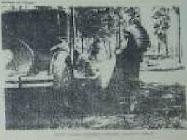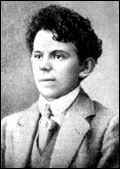We apply faulty words to profound things, words which are then misunderstood and misused, by ourselves and others. Yet the words are necessary - or perhaps we simply desire them, we can't live without them.
The Spirit of God = the Spirit of Love. The Mind of the Creator = the Mind of Love. The source of all phenomena is a creative origin, a living Mind - oriented toward wisdom, freedom, wonder, truth. Toward Life.
Powerful intellectual movements have arisen which simultaneously enlighten us about our moral darkness, while at the same time denying our capacity to change by means of such knowledge. We are held captive by our own unconscious drives (Freud, Lacan). We are unknowingly dedicated to a tragic will-to-power (Nietzsche, Schopenhauer, Heidegger). Even those who acknowledge the power of human enlightenment transmute it into an ineluctable, objective process of historical determinism (Hegel, Marx).
The three traditional Abrahamic religions, in contrast, make a bolder claim : "You shall know the truth, and the truth shall make you free." God is a personal God (despite the fact that this hypothesis is beyond our comprehension). The moral root of civilization and humanity consists in the re-ordering of the individual human soul toward higher ethical purpose - toward the Spirit of Love, and the common good which is its expression. Toward what is called "the Great Commandment" (to love God with all your heart and soul and mind and strength, and likewise, to love your neighbor as yourself).
All three Abrahamic religions have much to answer for. The root of the problem lies in the idolatry of their own verbalized doctrines.
Judaism forgets the global, providential purpose of its own calling (to be a "guide to all nations"), and devotes itself to separation from "the outsiders". As a result, Judaism is unable to recognize its own Messiah, the one who is actually carrying out the providential purpose of the original commandments.
Christianity, once it canonized its texts and latched onto worldly states (in Constantinople & Rome), began to persecute its own elder brother (Judaism) - misreading St. Paul's polemical distinctions between "law" and "grace", and using them to lay the foundations of Western and global anti-semitism, with all its unspeakable historic consequences. Jesus said, "I have come not to abrogate the law, but to fulfill it." Law and grace depend upon each other : the Spirit of Love is law-abiding (in the sense of abiding by the Great Commandment).
Islam denies God's saving intervention in history, by way of Judaism, and his "personification" in the Messiah (Christianity). As a result the Spirit of God remains remote and unaccountable, reduced to a commander of submission. But the Oedipal dynamic underlying human anthropology - outlined in Robert A. Paul's important study, Moses and Civilization - illuminates the psycho-sociology of a patriarchal world order. Where there is submission there will inevitably also be the flip side of the coin : domination.
We have all gone astray in the midst of our imaginings, says the prophet. We inhabit a conjectural world, and our conjectures are finite, human, & imperfect, wrote Nicholas of Cusa.
This dynamic which Robert Paul explores is at work in all three Abrahamic religions. Ultimately I think we could characterize it as the historical legacy of human nature's battle with death. Death threatens the continuance of human social life. Paul's anthropology explains how the the paradoxical conjunction of 1) individual mortality with 2) collective social continuity, produces transformative mythologies of "royal succession", the conjunction of divine and earthly kingship serving as the basic model or "political explanation" for the existential dilemma of human mortality. The Oedipal complexes and neuroses on the individual level are recapitulations of an essentially collective, political, anthropological reality (or we could say they are two faces of a connected reality). This, for Paul, is a global phenomenon, exhibiting its variations (transformations) in every human culture (not just the Abrahamic religions).
Two things seem clear to me from Paul's analysis :
1) The deep-rooted violence which accompanies this human history is at least in part a consequence of patterns of patriarchy. The whole question of "royal succession" - Freud's young males of the horde overthrowing the tyrannical old males - is rooted in a power struggle over the pacified, objectified female members of the puzzle. The third person - the woman in the middle - is left out of the equation, except as a matrix of sexual pleasure and biological continuance.
2) Paul's model, while deeply explanatory of human behavior, is fundamentally empirical. It is scientific, in his own sense of based on the "reality principle". Thus, for Paul, any transcendental or metaphysical dimension is ruled out of the analysis. The positing of a cosmic Spirit or a personal God or eternal life or life-after-death, or any such metaphysical proposition, is held to be a product of human imagination, or at least as groundless in an "evidentiary" sense.
I would suggest, however, that modern science itself has unraveled many of its own materialist, positivist, and empirical certainties in the course of the last century. Physics, chemistry, mathematics and biology have all bumped up against the unknown, the unexplained, and the paradoxical. This, of course, is their modus operandi and raison d'etre : but these revolutionary "unknowns" have somewhat tempered the pride of scientific positivism. It's possible again to imagine our own blindness : & to wonder in the face of the unknown. As I understand it, the spirit of poetry, of the human imagination, still presents possibilities which stretch beyond the "reality principle" as we know it. In the matrix of the poetic (a feminine Muse?) it's possible to "remember" the roots of reality in creative freedom : to find a harmony between the beauty and wonder of nature and the intuition of a cosmic Mind... a divine Spirit... a Spirit of Love...
6.12.2014
Subscribe to:
Post Comments (Atom)



No comments:
Post a Comment